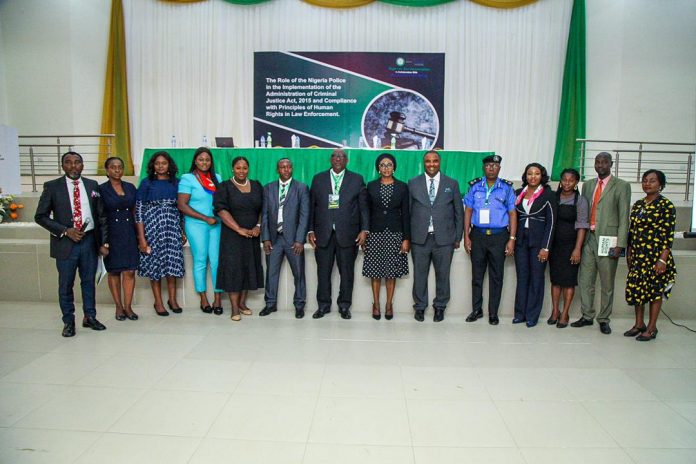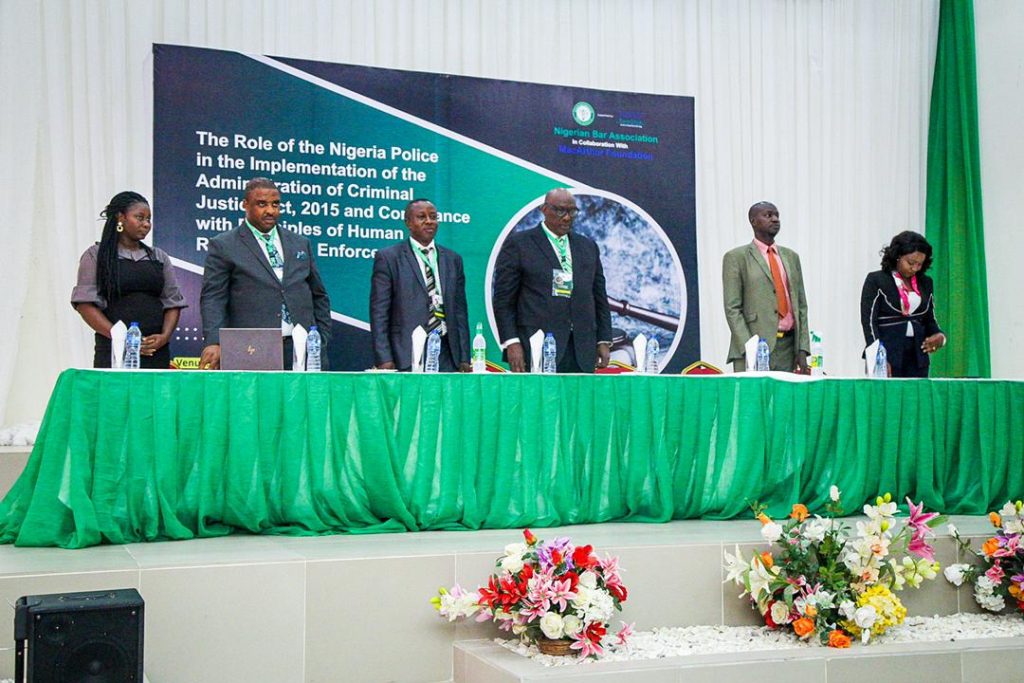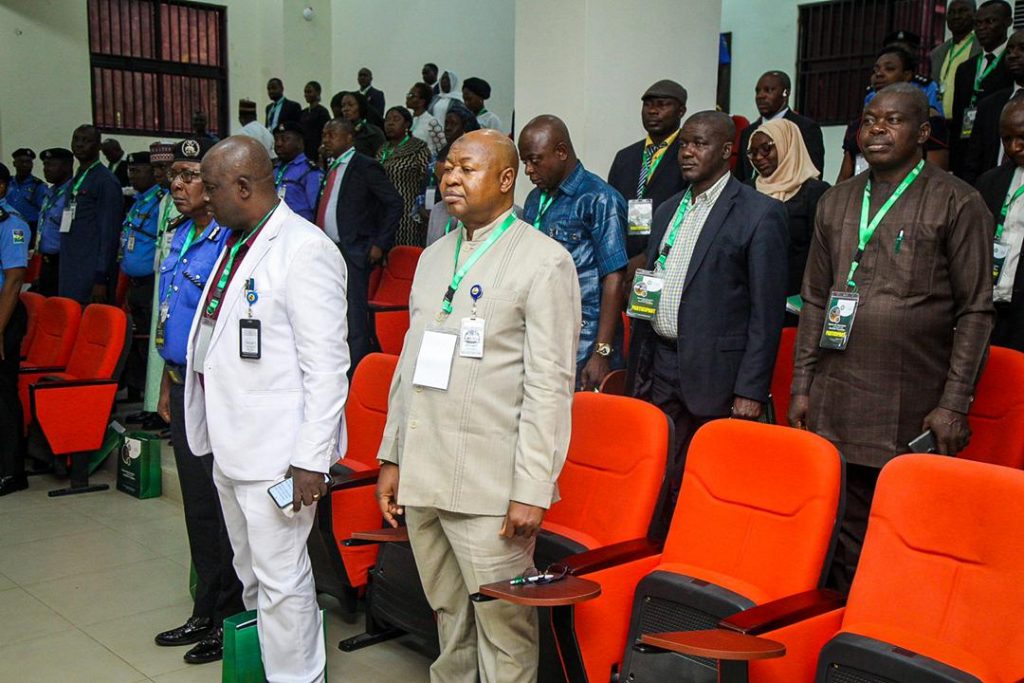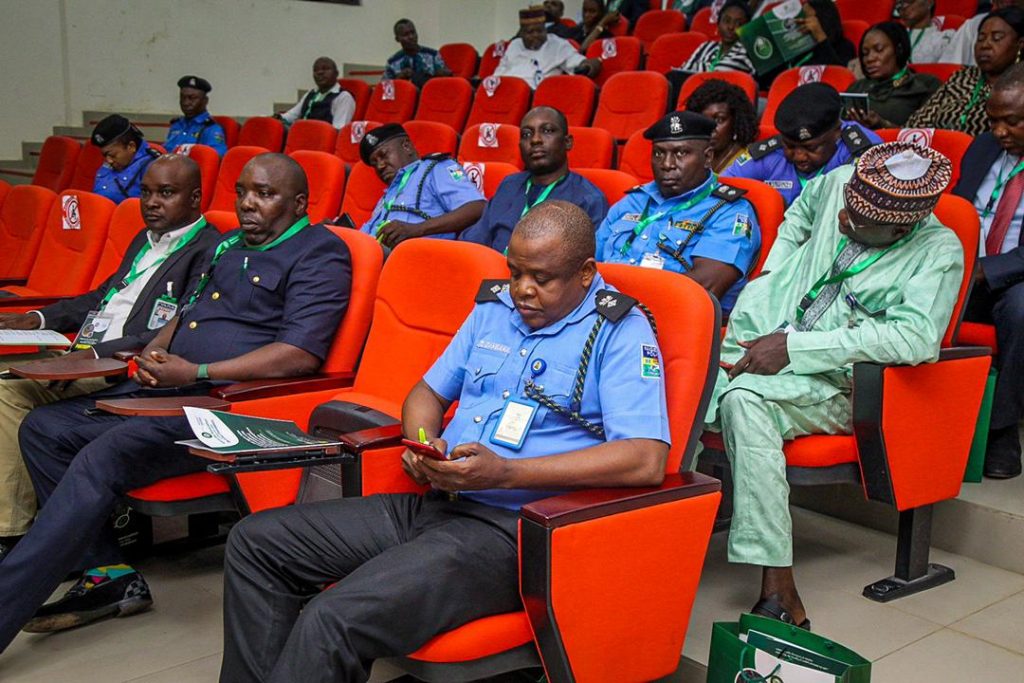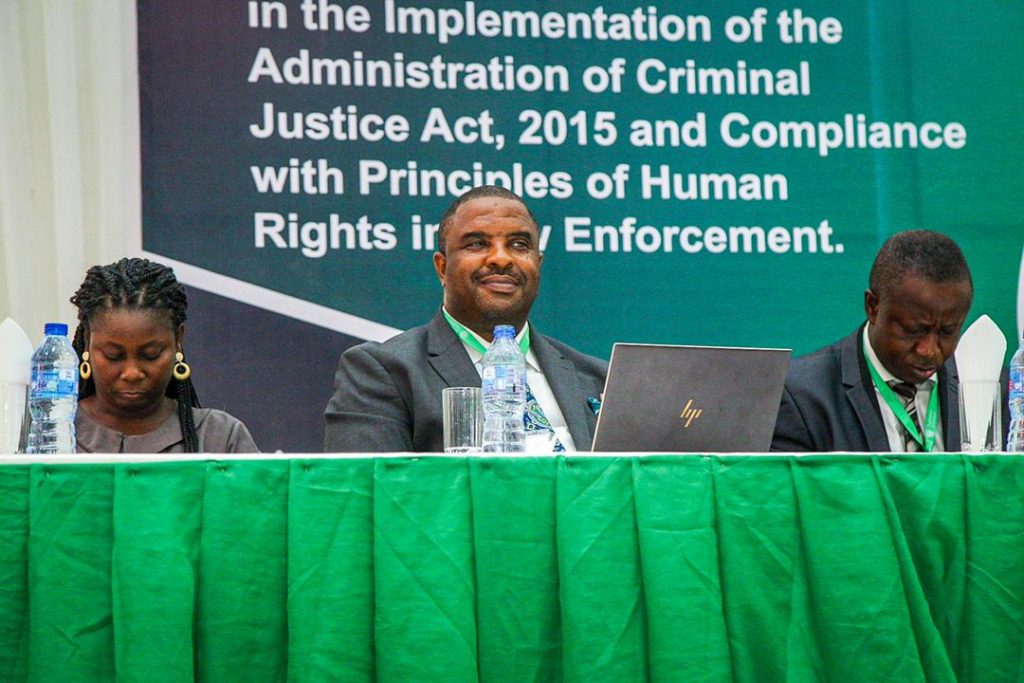The role of the Nigerian police in the administration of criminal justice and its level of compliance with the principles of fundamental human rights (as enshrined in the ACJL Act of 2015) was the subject of a one-day workshop organised by the Nigerian Bar Association, in conjunction with the MacArthur Foundation on Wednesday, May 18, 2022, at the Association’s secretariat in Abuja, the nation’s federal capital.
The workshop was graced by over 150 persons from the police, the NBA and other relevant stakeholders, notably Mr Tobenna Eijiokwe, Chairman, NBA Institute of Continuing Legal Education; Chief J.K. Gadzama, SAN, Chairman, NBA Security Agencies Relations Committee; representatives of Commissioner of Police Babaji Sunday, FCT Commissioner of Police; Umar Mohammed, Director of Public Prosecution at the Federal Ministry of Justice; the Hon. Justice Hussein Baba Yusuf, Chief Judge of the FCT; as we’ll as Mr Idris Bawa, Advisor, Police Programme, GIZ, Africa-Nigeria; Kate Okoh-Kpina, Advisor, Rule of Law at the GIZ Police Programme, Africa-Nigeria; and Mercy Agada Ijato, Treasurer of the NBA.
The event featured intensive and insightful discussions on a number of issues, beginning with an opening address by Idris Bawa, Esq., who serves as Adviser to the Police Programme at GIZ Africa-Nigeria. He spoke on ‘Compliance with Principles of Human Rights and Rule of Law in Law Enforcement.’
Pointing out the issue of rights, he asked rhetorically if we really do have respect for rights in Nigeria. All people are entitled to the same rights, he said, adding that the definition of the rule of Law according to the United Nations, encompasses persons, institutions and states, and require certain measures to ensure adherence in accordance with international norms designed to uphold the supremacy of the law, equality before the law, accountability to the law, fairness in the application of the law, separation of powers, participation in decision-making, legal certainty, avoidance of arbitrariness, and procedural and legal transparency.
Speaking on the role of the Nigeria police in the administration of criminal justice, Bawa cited Section 4 of the NPF (Establishment) Act 2020 in noting that the mandate of the police included the following:
Maintain public safety, law and order.
Protect the lives and property of all persons in Nigeria.
Enforce all laws and regulations without any prejudice to Acts of other security agencies.
Prevent and detect crimes and protect rights and freedom of every person in Nigeria as provided under the Constitution and International instruments.
Discharge such duties within and outside Nigeria as may be required of it under the Act or any other law.
Collaborate with other agencies to take necessary action and provide support to persons in distress, including victims of road accidents, fire disaster, earthquakes and floods.
Facilitate the free passage and movement on highways, roads and streets open to the public.
Vet and approve the registration of private detective schools and private investigative outfits.
He also threw light on the powers of the police as enshrined in Sections 31, 33 and 44 of the Police Act – including the methodology of interview and interrogation; conditions for bail according to Sec. 35; and the right to personal liberty. He went on to spell out the conditions for the denial of bail according to Section 165 of ACJA 2015..
Bawa’s presentation was accompanied by a video clip, after which there was a brief audience participation session in the role of the judiciary in actualizing the mandate of the police as enumerated above, as well as the importance of funding.
The second session of the workshop featured a presentation by Prof. Yemi Akinseye-George, SAN, which was presented on his behalf. The learned silk spoke on the topic, ‘The Role of Police in the Implementation of ACJA 2015.’
In his opening salvo, Prof. Akinseye-George described the police as the entry point into the criminal justice system – either through reports from the public or via its own investigation. The manner in which the police carry out their duties, he said, could determine whether or not the suspect would obtain justice. He asserted that the purpose of ACJA 2015, was to promote efficient management of criminal justice institutions; the speedy dispensation of justice; protecting the society from crime; and protecting the rights and interests of the suspect, the defendant, and the victim. The Act, he added, provides for a more effective and well-organized police force driven by the principles of transparency and accountability in operations and the prudent management of resources.
He also noted that ACJA 2015 contains the following safeguards against unlawful arrests and investigation, as well as speedy investigation: No unnecessary restraint, force may be used in limited circumstances, Inform suspect of the reason for arrest, duty of the arresting officer to Inform suspect of rights, notify next of kin, prohibition of arrest in lieu and humane treatment of arrested persons. Under the Act, an arresting police officer shall record information about the suspect immediately and complete the process within a reasonable time not exceeding 48 hours.
He also touched on electronic recording of confessional statements, stating that in line with the law, where an arrested suspect volunteers to make a confessional statement, the police officer shall ensure that the making and taking of the statement shall be in writing and may be recorded electronically on a retrievable video compact disc or such other audio-visual means.
Summing up, Prof. Akinseye-George, SAN, recommended the following measures going forward:
Increased training opportunities for officers and other persons employed by the police;
Creating enduring cooperation and partnership between the Police and host communities in maintaining peace and combating crimes nationwide.
The police and relevant stakeholders should undertake a meticulous implementation of the law with the provision of adequate resources for optimum performance.
He concluded by listing a number of bold and innovative provisions in ACJA 2015 aimed at addressing the problems of delay and lack of coordination in the system of administration of justice, expressing confidence that the successful implementation of the law will depend largely on the willingness of the police to comply with the protocols and other standards legislated by the Act.
As in the first session, the Professor’s presentation was followed by audience participation session, as a participant expressed displeasure at the practice of the police assuming the role of a debt recovery agency and even taking 10% for every amount recovered, and called for an end to the practice.
It is envisaged that successive workshops would involve a more active participation and engagement by members of the judiciary as well as all other stakeholders that were not fully represented at this one.
-Advertisement-
Grab our latest Magazine, "Kelechi Amadi-Obi - Transcending the worlds of Law, Visual Art and Photography". Get your order fast and stress free.
For more details about Newswire Law&Events Magazine, kindly reach out to us on 08039218044, 09070309355. Email: newswiremagazine@yahoo.co.uk. You will be glad you did
Download E-MagazineDo you want to be heard, your events covered, your articles published, or need to advertise your products and services on our Blog and Magazine, reach out to us at Newswire Law and Events, you will be glad you did. For more details about our services, please call: 08039218044, 09070309355. Email: newswiremagazine@yahoo.co.uk



